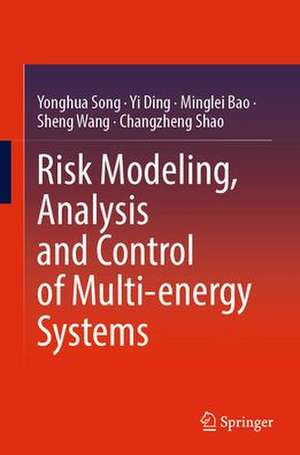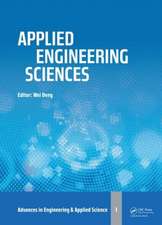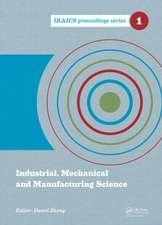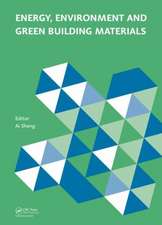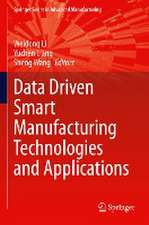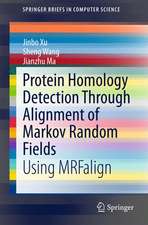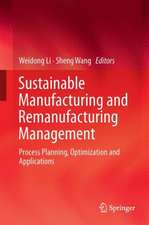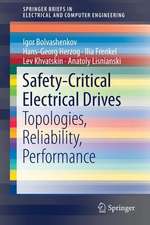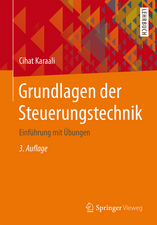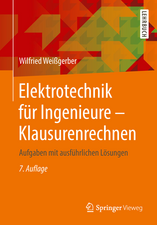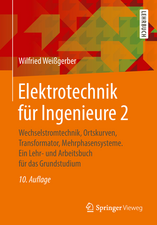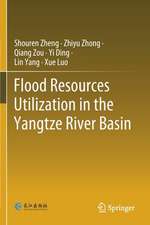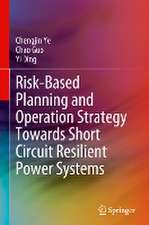Risk Modeling, Analysis and Control of Multi-energy Systems
Autor Yonghua Song, Yi Ding, Minglei Bao, Sheng Wang, Changzheng Shaoen Limba Engleză Hardback – 9 iun 2023
| Toate formatele și edițiile | Preț | Express |
|---|---|---|
| Paperback (1) | 731.07 lei 38-44 zile | |
| Springer Nature Singapore – 9 iun 2024 | 731.07 lei 38-44 zile | |
| Hardback (1) | 896.08 lei 3-5 săpt. | |
| Springer Nature Singapore – 9 iun 2023 | 896.08 lei 3-5 săpt. |
Preț: 896.08 lei
Preț vechi: 1092.78 lei
-18% Nou
Puncte Express: 1344
Preț estimativ în valută:
171.47€ • 179.48$ • 142.71£
171.47€ • 179.48$ • 142.71£
Carte disponibilă
Livrare economică 10-24 martie
Preluare comenzi: 021 569.72.76
Specificații
ISBN-13: 9789819910892
ISBN-10: 9819910897
Pagini: 254
Ilustrații: XIV, 254 p. 105 illus., 91 illus. in color.
Dimensiuni: 155 x 235 mm
Greutate: 0.59 kg
Ediția:2023
Editura: Springer Nature Singapore
Colecția Springer
Locul publicării:Singapore, Singapore
ISBN-10: 9819910897
Pagini: 254
Ilustrații: XIV, 254 p. 105 illus., 91 illus. in color.
Dimensiuni: 155 x 235 mm
Greutate: 0.59 kg
Ediția:2023
Editura: Springer Nature Singapore
Colecția Springer
Locul publicării:Singapore, Singapore
Cuprins
Multi-energy systems and risk issues.- A Framework for Risk Modeling of Integrated Electricity and Gas Systems Utilizing Universal Generating Function Techniques.- Short-Term Risk Evaluation of Integrated Electricity and Gas Systems Considering Dynamics of Gas Flow.- Risk Evaluation of Integrated Electricity and Gas Systems Considering Cascading Effects.- Definitions and Risk Modelling of Two-Interdependent-Performance Multi-State System and its Application for CHP units.- Operational Risk Assessment of Integrated Electricity and Heating Systems with CHP units.- Operational Risk of Multi-Energy Customers Considering Service-Based Self-Scheduling.- Multi-phase Risk Modelling and Evaluation of Multi-energy Systems under Windstorms.- Long-term Reserve Expansion of Integrated Electricity and Gas Systems for Risk Mitigation.- Operational Risk Assessment of Integrated Electricity and Heating Systems with CHP units.
Notă biografică
(1) Professor Yonghua Song is the Rector of the University of Macau and Director of the State Key Laboratory of Internet of Things for Smart City. He has held a number of leadership positions and served as professor in electrical engineering at British and Chinese universities, including Pro-Vice-Chancellor of Brunel University and Pro-Vice Chancellor of University of Liverpool, Assistant President of Tsinghua University and Executive Vice President of Zhejiang University.
(2) Yi Ding is a Professor in the College of Electrical Engineering, Zhejiang University, also the recipient of National Outstanding Youth Fund and National Young Specialists. He has been engaged in risk analysis and control of complex power system, analysis of renewable energy optimization of smart grid, analysis and optimization of integrated energy system operation, power market, demand-side management and other related research work. He has received one “National Science and Technology Progress Award”, one “Scientific and Technological Award of Zhejiang Province” and one “China Electric Power Science and Technology Award”, as well as an “Award of Excellent Science and Technology Researcher of China Electric Power”.
(3) Minglei Bao received both the Ph.D. degrees in electrical engineering from Zhejiang University in 2021, and B. Eng degrees in electrical engineering from Shandong University in 2016.He is currently a post-doctor in the School of Energy Engineering, Zhejiang University. He has been engaged in risk analysis of energy systems, electric markets and optimization of multi-energy systems. He has published more than 20 SCI-indexed papers. He has received the award of advances in electric power science and technology of Zhejiang.
(4)Sheng Wang (Member, IEEE) received both the Ph.D. and B. Eng degrees in electrical engineering from Zhejiang University in 2021 and 2016, respectively. He is currently a Post-doctoral Fellow with the State Key Laboratory of Internet of Things for Smart City, University of Macau. His research interests include optimization and reliability evaluation of integrated energy systems, and the low-carbon strategy for urban energy systems. He was elected in the Academic Rising Star Program for Ph.D. students at Zhejiang University. He has received the award of advances in electric power science and technology of Zhejiang, the best paper in the Energy Internet Committee of CSEE, and the best paper in the Integrated Smart Energy International Conference.
(5)Changzheng Shao received both the Ph.D. degrees in electrical engineering from Zhejiang University in 2020, and B. Eng degrees in electrical engineering from Shandong University in 2015.He is currently an associate professor in the School of Electric Engineering, Chongqing University. He has been engaged in reliability analysis of complex power systems and integrated energy systems. He has published more than 40 SCI-indexed papers. He has received one “Power Technology Innovation Award”.
Professor Song has long been engaged in electrical power system research. In recent years, he focuses on renewable energy technologies and sustainable development in particular. He was awarded Honorary DSc by Brunel University in 2002, Honorary DEng by University of Bath in 2014 and Honorary DSc by University of Edinburgh in 2019. In 2020, he won a second prize of the State Scientific and Technological Progress Award and the prize for Scientific and Technological Progress from the Ho Leung Ho Lee Foundation. In 2022, he was awarded the Guanghua Engineering Science and Technology Prize. Professor Song was elected a fellow of the Royal Academy of Engineering (UK) in 2004, IEEE fellow in 2007 and a member of Academia Europaea in 2019. He is a member of the Executive Board of China Association for Science and Technology (CAST) and Vice President of Chinese Electrotechnical Society (CES) . Professor Song has been appointed as Advisor of Science and Technology Committee of the Macao SAR Government since 2002.
(4)Sheng Wang (Member, IEEE) received both the Ph.D. and B. Eng degrees in electrical engineering from Zhejiang University in 2021 and 2016, respectively. He is currently a Post-doctoral Fellow with the State Key Laboratory of Internet of Things for Smart City, University of Macau. His research interests include optimization and reliability evaluation of integrated energy systems, and the low-carbon strategy for urban energy systems. He was elected in the Academic Rising Star Program for Ph.D. students at Zhejiang University. He has received the award of advances in electric power science and technology of Zhejiang, the best paper in the Energy Internet Committee of CSEE, and the best paper in the Integrated Smart Energy International Conference.
(5)Changzheng Shao received both the Ph.D. degrees in electrical engineering from Zhejiang University in 2020, and B. Eng degrees in electrical engineering from Shandong University in 2015.He is currently an associate professor in the School of Electric Engineering, Chongqing University. He has been engaged in reliability analysis of complex power systems and integrated energy systems. He has published more than 40 SCI-indexed papers. He has received one “Power Technology Innovation Award”.
Textul de pe ultima copertă
This book focuses on the risk modeling, analysis and control of multi-energy systems considering cross-sectorial failure propagation. Both models and methods have been addressed with engineering practice. This is accomplished by doing a thorough investigation into the modeling of system physics and reliabilities in both long- and short-term phases. Different models and methods to evaluate the risk of multi-energy systems considering various disturbances, e.g., component failures, load uncertainties and extreme weather, are studied in detail. Furthermore, several risk control strategies for multi-energy systems, such as long-term capacity planning and integrated demand response, are analyzed in this book, which is especially suited for readers interested in system risk management. The book can benefit researchers, engineers, and graduate students in the fields of electrical and electronic engineering, energy engineering, complex network and control engineering, etc.
Caracteristici
Comprehensively studies risk modeling, analysis and quantification of multi-energy systems Proposes effective measures to control risks of multi-energy systems Implements interdisciplinary among electrical engineering, thermodynamics, complex system and etc
